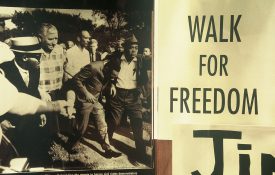-
Scanning the Brain: Scientists Examine the Impact of fMRI Over the Past 20 Years
Understanding the human brain is one of the greatest scientific quests of all time, but the available methods have been very limited until recently. The development of functional magnetic resonance imaging (fMRI) -- a tool used to gauge real-time brain activity by measuring changes in blood flow -- opened up an exciting new landscape for exploration. Now, twenty years after the first fMRI study was published, a group of distinguished psychological scientists reflect on the contributions fMRI has made to our understanding of human thought.
-

Claims of “Post-Racial” Society and Other Denials of Racism May Reflect Ignorance of History
Commonly observed differences in how groups perceive racism may be explained by ignorance about — and even denial of — the extent of racism over the course of history, a psychology study suggests.
-
If We Go Over the Fiscal Cliff, Will People Spend or Save? Childhood Environments May Hold the Key
In the face of hard times, which strategy gives us the best shot at survival: saving for the future or spending resources on immediate gains? The answer may depend on the economic conditions we faced in childhood, according to new research published in Psychological Science, a journal of the Association for Psychological Science. Drawing on life history theory, Vladas Griskevicius of the University of Minnesota’s Carlson School of Management and colleagues hypothesized that the strategy a person takes when times are tight may be determined, at least in part, by features of their childhood environment.
-
New Research From Psychological Science
Read about new and exciting research published in Psychological Science and Clinical Psychological Science. Visual Context Processing in Schizophrenia Eunice Yang, Duje Tadin, Davis M. Glasser, Sang Wook Hong, Randolph Blake, and Sohee Park Researchers know that people with schizophrenia exhibit visual abnormalities, but they are still not sure how these abnormalities relate to schizophrenia's symptoms and etiology. Healthy and schizophrenic participants were instructed to judge the appearance of a center stimulus by comparing it with a fixed-reference stimulus.
-

Which Study Strategies Make the Grade?
A scientific review suggests that several popular study strategies are ineffective, while effective strategies are underused.
-
Small Price Differences Can Make Options Seem More Similar, Easing Our Buying Decisions
Some retailers, such as Apple’s iTunes, are known for using uniform pricing in an effort to simplify consumers’ choices and perhaps increase their tendency to make impulse purchases. But other stores, like supermarkets, often have small price differences across product flavors and brands. As counterintuitive as it might seem, these small price differences may actually make the options seem more similar, according to new research published in Psychological Science, a journal of the Association for Psychological Science. The research shows that adding small differences can actually help to make choosing less difficult and reduce the likelihood that we’ll put off making a choice.

